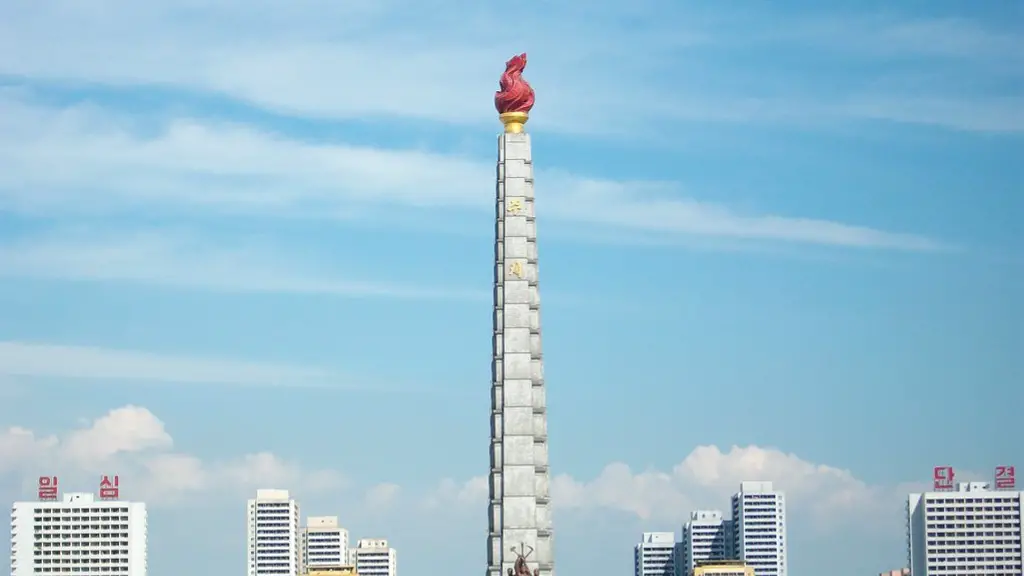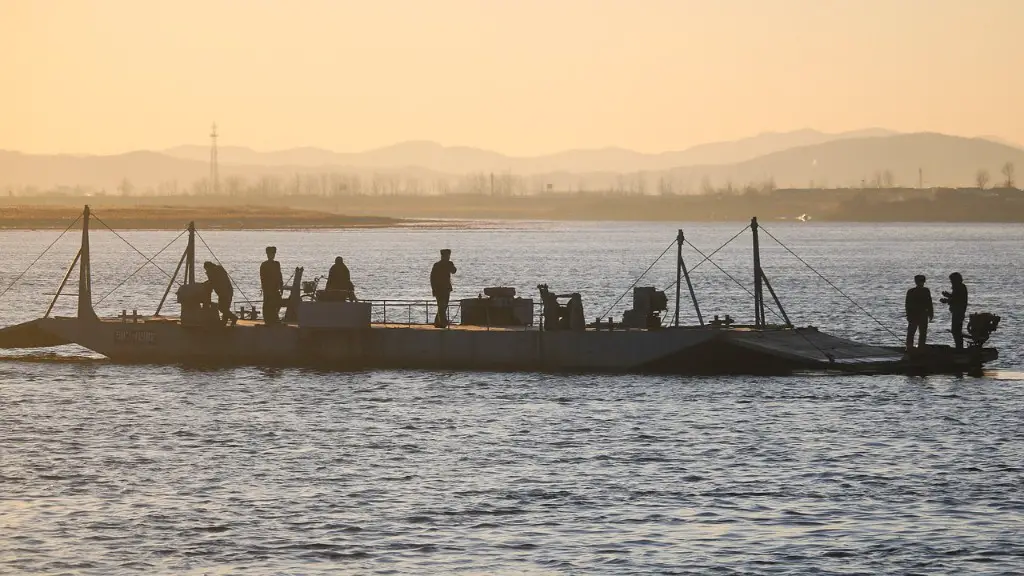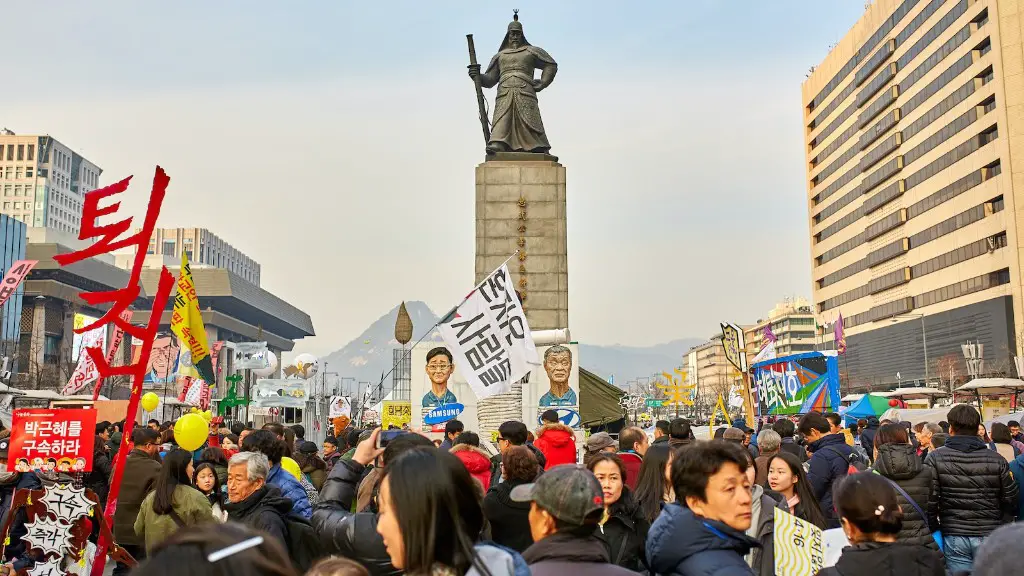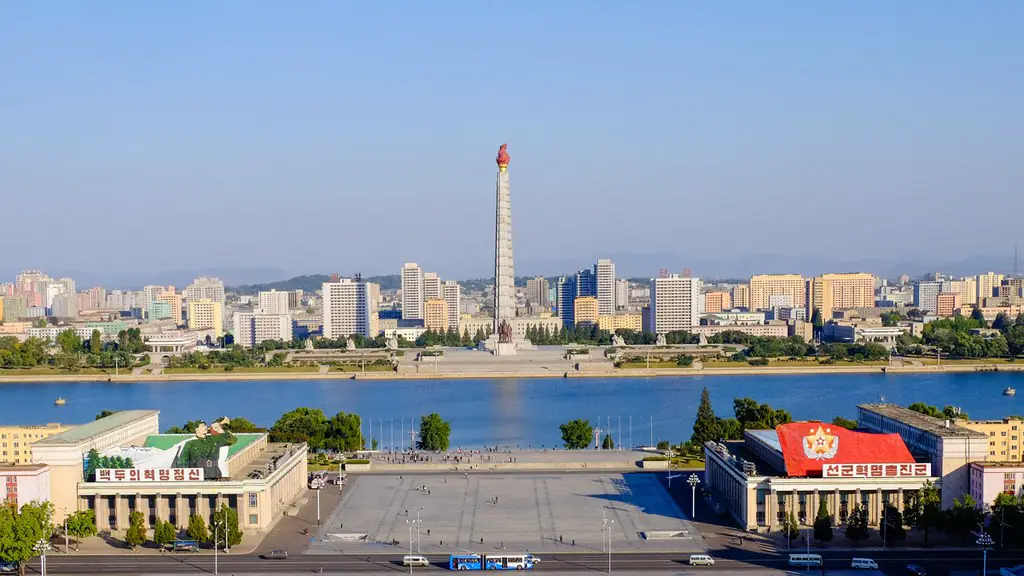The situation in North Korea is one that is impossible to ignore; its exceedingly poor human rights record and its hostile actions towards its citizens and others in the world have earned it the reputation of a pariah nation among the global community. But why is nobody doing anything about it? Is it because it is too risky to intervene, or because the international community is too scared of hostility from North Korea’s leader? This article will examine the reasons why no country has taken any meaningful action against North Korea.
One of the main reasons why no action has been taken against North Korea is because of its self-imposed isolation. It has become increasingly unfavorable for any foreign power to pursue interests in North Korea, as the state has become militant and unpredictable with its own citizens. North Korea’s leader, Kim Jong-un, has managed to hold a firm grip on power by instituting an oppressive system of rule that has created a sense of distrust among the rest of the world.
Furthermore, North Korea has become increasingly belligerent towards its own citizens and the outside world, with its nuclear ambitions sparking fears of a regional or global crisis. The country’s actions have gone beyond mere posturing and have resulted in international incidents such as missile launches and the sinking of a South Korean naval vessel in 2010. This has caused many countries to take a cautious approach to North Korea, as any action taken could potentially escalate and lead to further conflict.
Another factor that has limited any meaningful action taken against North Korea is the fear of a massive humanitarian disaster if the country were to face a major military conflict. North Korea’s population of approximately 25 million is heavily dependent on foreign aid, and the combined effect of sanctions and an all-out military conflict would likely result in a humanitarian catastrophe. This has led some countries to believe that taking a pacifist approach to North Korea is the best way to prevent any major conflict.
The lack of political will and resources for meaningful action against North Korea has also been a major factor. Despite the fact that North Korea has been a top agenda item for the United Nations Security Council for nearly two decades, very little has been done to address the crisis. This is due, in part, to the fact that the UN has limited resources, and is also hampered by the rift between the various members of the Security Council.
Finally, the role of China cannot be overlooked. As North Korea’s closest ally and largest trading partner, China has been able to exercise a considerable degree of influence over North Korea and its policies. As such, any serious discussion of how to approach North Korea must take China’s role into consideration.
Impact on the Region
The situation in North Korea has had a profound effect on the surrounding region, with countries such as South Korea and Japan feeling the direct impact of North Korea’s actions. This has led to a stronger focus on regional security and the need to strengthen military and economic ties between countries in order to defend against any potential aggression from North Korea.
The threat of a nuclear attack by North Korea has also been one of the major regional security concerns, as this would have significant consequences for the entire region. This has led South Korea and Japan to take a more aggressive stance towards North Korea, with both countries pushing for tougher sanctions and better surveillance of North Korea’s activities.
The situation has also had a direct impact on international relations, with the United States and China in particular finding themselves in a difficult position. On one hand, the US has sought to contain North Korea’s nuclear ambitions and protect its allies, while on the other, China has sought to maintain diplomatic ties with North Korea and persuade it to abandon its nuclear ambitions.
The conflict in North Korea has also had a significant economic impact on the region, with certain countries feeling the brunt of the burden due to the lack of foreign direct investment and the lack of access to important markets. This has led to slower economic growth in many parts of Asia and has had a negative impact on the regional economy.
Political Implications
The ongoing conflict in North Korea has significant political implications as well, with many countries being deeply divided over how to handle the crisis. The United States and South Korea, for example, are in support of a firm stance against North Korea, while countries such as China are pushing for a more diplomatic solution.
The conflict has also led to divisions between those who think that North Korea should be allowed to pursue nuclear weapons for its own protection and those who believe that North Korea should be disarmed by any means necessary. This has further complicated the situation and has made reaching a consensus even more difficult.
Furthermore, the lack of unified international action on North Korea has undermined the credibility of international organizations such as the United Nations and undermined the legitimacy of its Security Council. This has caused some countries to take matters into their own hands and adopt unilateral action, leading to further divisions among the international community.
Finally, the North Korea conflict has highlighted the need for better international collaboration and communication in order to effectively address these kinds of crises. The inability of the international community to reach a consensus on North Korea has shown that better cooperation and coordination between countries is necessary in order to prevent similar crises from occurring in the future.
Possible Solutions
Given the complexity of the situation in North Korea, finding a viable solution is going to be difficult. However, some possible solutions have been proposed by various international organizations and experts.
One approach that has been suggested is to increase economic pressure on North Korea by introducing tougher sanctions and restricting trade with the country. This could potentially pressure North Korea’s leadership into engaging in meaningful negotiations and abandoning its nuclear ambitions.
Another possible solution is to engage in diplomatic talks with North Korea and use incentives such as trade agreements to persuade the country’s leadership to abandon its nuclear weapons program. This could potentially be effective if the international community could come to an agreement on key issues such as denuclearization and human rights.
Finally, some experts have proposed a more aggressive approach by undertaking military action against North Korea in order to deter the country from further nuclear advancement. However, this is a dangerous option and could potentially lead to catastrophe for North Korea and the region.
Consequences of Inactivity
The consequences of inaction on North Korea could potentially be disastrous, as the situation continues to deteriorate and the potential for nuclear conflict continues to increase. The consequences of a potential military conflict in the region would be severe, with devastating losses of life and an immense economic cost being inflicted upon all sides.
Furthermore, the lack of action on North Korea could also lead to a proliferation of nuclear weapons, as other countries could see North Korea as a model for achieving nuclear capability. This could have dire consequences for global security and could lead to a major arms race in the region and beyond.
Finally, the lack of action on North Korea could potentially destabilize the entire region and lead to further conflicts and tensions. This could potentially threaten the stability of the region and impact international relations.
International Responsibility
The responsibility to act on North Korea lies largely with the international community, as any solution to the crisis will require a unified response. It is up to the United Nations and its members to come together and devise a plan that will effectively address the root cause of the crisis and prevent it from escalating further.
Furthermore, the international community must be willing to take action and take the appropriate measures to ensure the safety and security of all parties involved in the crisis. This may require sanctions, diplomatic talks, or even military action, depending on the situation.
Finally, the international community must also be willing to work together in order to effectively address the situation in North Korea and provide humanitarian aid to the victims of the conflict. This will require a coordinated effort from all countries involved and could potentially lead to a resolution to the crisis.
Conclusion
The conflict in North Korea is a complex situation with no easy solution. However, as the crisis continues to escalate, it becomes increasingly important for the international community to take action and find a viable solution. This will require international cooperation and a unified approach, and the consequences of inaction could potentially be disastrous.





